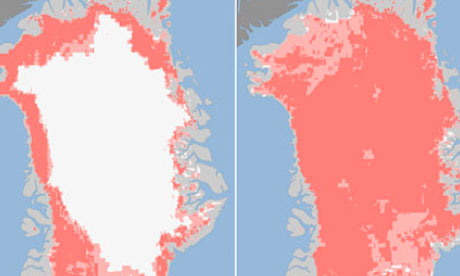But not just a normal summer:
http://www.nasa.gov/topics/earth/featur ... -melt.html
Greenland Summer
Moderator: Peak Moderation
- biffvernon
- Posts: 18538
- Joined: 24 Nov 2005, 11:09
- Location: Lincolnshire
- Contact:
-
Aurora
The Guardian - 24/07/12
Greenland ice sheet melted at unprecedented rate during July
The Greenland ice sheet on July 8, left, and four days later on the right.
An estimated 97% of the ice sheet surface had thawed by July 12.
The Greenland ice sheet melted at a faster rate this month than at any other time in recorded history, with virtually the entire ice sheet showing signs of thaw.
The rapid melting over just four days was captured by three satellites. It has stunned and alarmed scientists, and deepened fears about the pace and future consequences of climate change.
In a statement posted on Nasa's website on Tuesday, scientists admitted the satellite data was so striking they thought at first there had to be a mistake.
Article continues ...
Last edited by Aurora on 27 Jul 2012, 07:42, edited 1 time in total.
- biffvernon
- Posts: 18538
- Joined: 24 Nov 2005, 11:09
- Location: Lincolnshire
- Contact:
-
SleeperService
- Posts: 1104
- Joined: 02 May 2011, 23:35
- Location: Nottingham UK
Err.... I did at first glance. The sensationalist text didn't clarify that too well eitherbiffvernon wrote:I think the colour scheme for those diagrams is a bit silly. How many people will think all the Greenland ice has melted!
Scarcity is the new black
- biffvernon
- Posts: 18538
- Joined: 24 Nov 2005, 11:09
- Location: Lincolnshire
- Contact:
The Danes are looking beyond the weather:
http://www.bbc.co.uk/news/science-environment-19095069
http://www.bbc.co.uk/news/science-environment-19095069
Ice loss from Greenland's vast sheet may happen mainly in short bursts, research by Danish scientists suggests.
They used aerial photos dating back to the 1980s to plot shrinking of glaciers around the island's northwest coast.
In the journal Science, they show that most of the ice loss happened in two periods - 1985-1993 and 2005-10 - with relative stability in between.
...
They say it will be hard to project sea level changes from Greenland ice melt until these patterns are deciphered.
The researchers were able to show that there was a relatively stable spell in between the two periods of rapid loss, and suggest that this part of Greenland may be entering another stable interlude.
Until the long-term pattern is resolved, they suggest, it will not be possible to forecast sea level rise from Greenland's water store with any accuracy.
"These variations in the amount of thinning that we are able to document since the 1980s make it difficult to predict how much the world's oceans will rise over a longer period of time - a century for instance - as a result of Greenland glacial melt-water runoff," said study leader Prof Kurt Kjaer of the University of Copenhagen.
"However, it is certain that many of the present calculations and computer models of ice sheet conditions that built upon a short range of years since 2000 must be reassessed.
"It is too early to proclaim the 'ice sheet's future doom' and subsequent contribution to serious water problems for the world."
However, they conclude, it is likely that the Greenland ice is "becoming more sensitive" to rises in air temperature.
